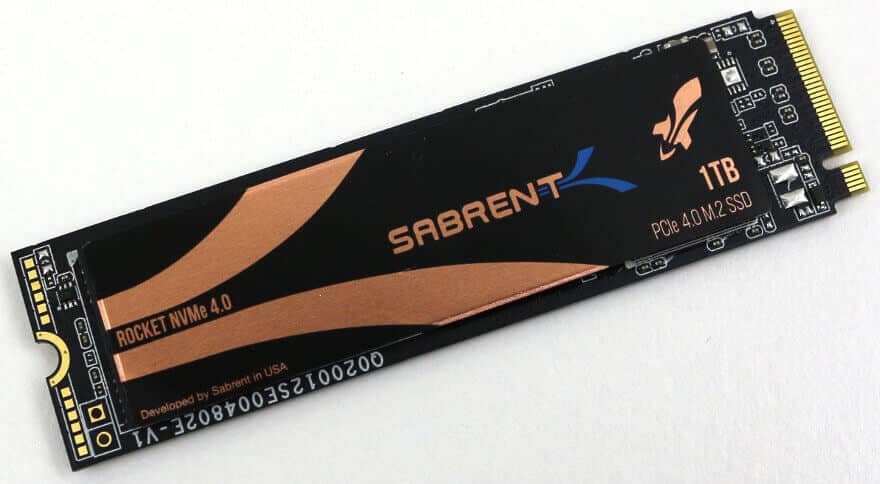



Today we take a look at another Gen.4 PCIe SSD which allows us to take performance to a whole new level. While the impressive performance is limited to the latest AMD system so far, there are a lot of people with those systems. Today it is the Rocket 4.0 from Sabrent with a capacity of 1TB that I have on the test bench.
The Rocket 4.0 starts out as a basic drive as we’ve seen so many. It is a standard NVMe 1.3 compliant M.2 drive with a 2280 form factor. As such, it will fit into most modern systems. But it isn’t a classic PCIe 3.0 drive like the ones I’ve been testing the last couple of years, this is one of the new PCIe 4.0 drives. This allows the drive to deliver better performance thanks to more bandwidth being available.


There are two versions of the Sabrent Rocket 4.0 available, one with a heatsink and one without. If your motherboard already has a heatsink for its M.2 slots, get the one without. If not, then get the one with the heatsink. These PCIe 4.0 drives can get quite hot and it is highly recommended that you use one to prevent thermal throttling.
As far as features go, you get what you would expect from such a drive. The Sabrent Rocket 4.0 supports SMART and TRIM commands as well as Advanced Wear Leveling, Bad Block Management, LDPC Error Correction Code, and Over-Provision.
As far as hardware goes, the drive is built with Toshiba’s 96-layer BiCS4 flash and the Phison E16 (PS5016-E16) controller. As such, we should get some great performance and endurance. The drive also features DDR4 cache in case you wonder about that.
Let us get to the thing I’m sure you’re here to find out, the performance ratings. The Sabrent Rocket 4.0 is rated for up to 5000MB/s when reading and 4400MB/s when writing sequential data. When it comes to random performance, it is rated for up to 750K IOPS at both reading and writing.
Endurance is at least as important as performance and the Rocket 4.0 doesn’t let us down here either. It has a TBW rating of 1800TB per 1TB capacity, an MTFB of 1.7 million hours, and it is backed by a 5-year warranty. That’s not bad at all, no sir. This is what we like to see.
“The Sabrent 1TB Rocket Nvme PCIe 4.0 M.2 2280 Internal SSD Extreme Performance Solid State Drive (SB-ROCKET-NVMe4-1TB) delivers all the advantages of flash disk technology with PCIe Gen4.0 x4 interface.
Based on Toshiba’s BiCS4 96L TLC NAND Flash memory, its performance speeds can reach up to 5000 MB/s (read) and 4400 MB/s (write) when using a PCIe Gen4 motherboard. Using a PCIe Gen3 Motherboard Speeds will reach up to 3400 MB/s (read) and 3000 MB/s (write). Power consumption is much lower than traditional hard drives, making it the best embedded solution for new systems.
The Sabrent 1TB Rocket Nvme PCIe 4.0 M.2 2280 Internal SSD was designed using PCIe 4.0 which allows for speeds of up to 5000 MB/s (read) and 4400 MB/s (write), significantly faster than PCIe 3.0.“
You can read more about the drive and its details on the official product page and series page.
The short answer is yes. There is nothing which prevents you from using the Sabrent Rocket 4.0 in a PCIe 3.0 motherboard or controller. That said, you won’t get the full speed as the older bus will limit the drive through the available bandwidth. However, if you’re planning to upgrade to a PCIe 4.0 motherboard shortly, you don’t have to stick with a PCIe 3 drive for it until you do. Make the Rocket 4.0 the first step in your upgrade.
You can find further information and full details of the Sabrent Rocket 4.0 drive on its official product page.
Electronic Arts (EA) announced today that its games were played for over 11 billion hours…
Steam's annual end-of-year recap, Steam Replay, provides fascinating insights into gamer habits by comparing individual…
GSC GameWorld released a major title update for STALKER 2 this seeking, bringing the game…
Without any formal announcement, Intel appears to have revealed its new Core 200H series processors…
Ubisoft is not having the best of times, but despite recent flops, the company still…
If you haven’t started playing STALKER 2: Heart of Chornobyl yet, now might be the…